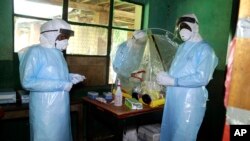Four cases of the Ebola virus have been confirmed in the northeastern Democratic Republic of the Congo, officials confirmed Wednesday.
Julien Paluku, governor of North Kivu province, announced the outbreak on Twitter, just a week after Congolese and U.N. health officials announced the end of a separate outbreak that killed 33 people in the country’s northwest. There is no evidence yet suggesting the two outbreaks in the Congo are linked.
“Although we did not expect to face a tenth epidemic so early, the detection of the virus is an indicator of the proper functioning of the surveillance system,” said the country’s health minister, Oly Ilunga Kalenga, in a statement.
Ebola was first identified in the Congo in 1976. A highly infective virus, it can be spread via contact with animals or the bodily fluids of the infected — including the dead.
The health ministry said there were 26 cases of hemorrhagic fever in the North Kivu province, including 20 deaths. Six samples from these patients were tested, and four tested positive for Ebola, the ministry said.
Officials have said they now feel better prepared for Ebola outbreaks, in sharp contrast to the 2014 epidemic of the virus, which killed more than 11,000 people, mostly in Guinea, Liberia and Sierra Leone.
To contain the most recent outbreak, health workers distributed an experimental but effective vaccine to anyone who had come into contact with those infected.
"We had a vaccine — and that I think is going to be extremely important for the future of Ebola control," Peter Salama, deputy director-general of emergency preparedness and response at the World Health Organization, told CNN of the July outbreak.
Experts from the health ministry will arrive in the region on Thursday to coordinate a response to the virus, the ministry said.





